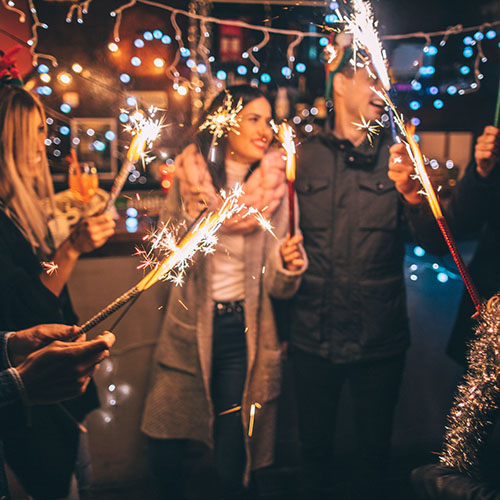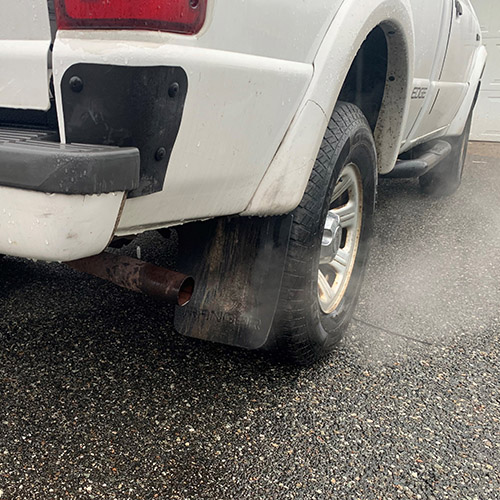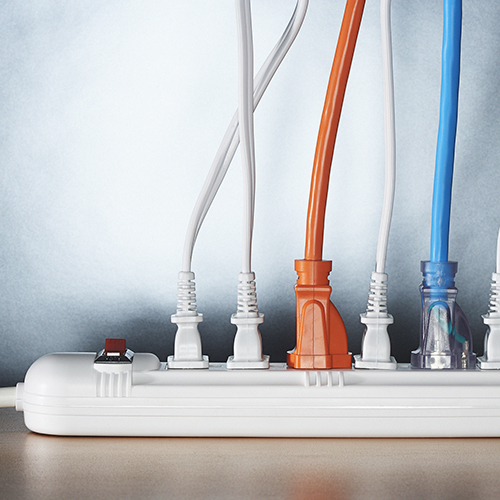Family Friendly Tips for a Safe Holiday Season

Some communities in New Jersey celebrate the holidays by sending a firetruck through the neighborhoods carrying Santa Claus. In other communities, family and friends band together to sing carols. Some communities take pride in their outdoor directions, becoming tourist destinations for families to appreciate the lights. Elsewhere, volunteers dress up as elves and request donations to local charities to make the holidays enjoyable for less fortunate families.
Regardless of how your family celebrates the holidays, one core truth remains: the holidays are a time for families to get together and enjoy each other’s company. Your family could include anything ranging between pets, children, siblings, significant others, parents, or grandparents. Whether you’re hosting the holidays in your house or traveling to someone else's, there are key safety tips you should keep in mind for the holiday season.
For Pets
- Beware poisonous materials in your decorations.
Plants like poinsettias, mistletoes, and holly can be poisonous to pets. The preservatives that you use in your Christmas tree water could also cause stomach upset in pets. The Canadian Center for Occupational Health and Safety recommends using sugar to preserve your tree, instead of water, if you’re afraid your pet might drink the tree water. Also keep batteries out of range of curious pets: punctured batteries can cause burns, and coin lithium batteries can easily be digested. - Secure your decorations.
Make sure your Christmas tree is tightly secured in its stand so it doesn't fall when JiJi crawls up the trunk. Avoid using tinsel, ribbon, or yarn on your tree or in your gifts: your cat might enjoy playing with it, but it's easy to swallow and can cause serious digestive problems. Keep breakable ornaments away from your pet's reach. - Avoid candles.
You'll normally want to keep all lighted candles secured on a stable surface and attended at all times. With a pet in the house, though, it's more likely that one will be knocked over, potentially causing a fire. It's best to avert that risk by using electric candles or avoiding candles altogether. - Keep people food to the people.
Chocolate and Xylitol are poisonous to pets, as are alcoholic drinks and other human foods which can damage your pet's digestive system. Keep people food to the people and pet food for your pets. Find special treats for your pets in the pet food aisle. - Prepare your pet for the party.
The ASPCA recommends keeping a separate room for your pets to hide if they’re feeling shy. If your pet is prone to biting strangers, keep it away from guests. Make sure your pet is secured in a safe area before using noisy poppers or setting off fireworks.
For Children
- Keep dangerous decorations out of reach of children.
Hang the breakable ornaments on the top of the tree, leaving the space on the bottom for family-made holiday projects. Make sure metal hooks and small removable parts are also out of range of children's grasping hands. Avoid using decorations that look like food, and make sure none of your decorations have lead in them. - Choose age-appropriate gifts.
Check warning labels, small parts, and choking hazards on all toys before giving them to your children. Keep small electronic parts, like button batteries and small video game cartridges, away from young children. Purchase a helmet with any bikes, skateboards, scooters, or roller skates; make sure the helmet fits appropriately; and enforce helmet laws when your child is using their new mode of transportation. The Consumer Product Safety Commission maintains a Toy Safety Q&A, as well as a list of toy recalls. - Practice food safety.
Use the back burner of the stove when cooking at home to avoid accidental burns. Keep heavy dishes of food away from the edge of the counter. When baking for a school holiday party or potluck, bring a copy of the ingredients list and ask other parents to also label their dishes for possible allergens.
Many of the same plants that are poisonous to your pets are also poisonous to humans. If your child ingests something poisonous, call the Poison Control Center at 1-800-222-1222. - Practice road safety.
Ensure that your car seat is installed appropriately when travelling anywhere. Carry your car seat on flights to make traveling from the airport easier. Use a booster seat and keep kids under the age of 13 in the back seat. Enforce seat belt rules whenever your car is in motion. - Practice home safety.
Keep toys out of frequently-traveled paths in your home to reduce tripping hazards. After opening presents, dispose of the wrapping paper right away so it doesn’t become a fire or slipping hazard. Keep kids warm, especially as outdoor temperatures start to sink.
For Teenagers
- Enlist your family's help.
Work together to create holiday decorations, cook holiday meals, and plan holiday events. Use this family time to teach children and teenagers health and safety skills. This might mean letting your licensed teenager take the wheel when traveling to a holiday party, or showing your teenager how to prepare turkey correctly. You can use this opportunity to warn your teenager about the increased presence of pedestrians and distracted drivers during the holiday season.
Do you live in Connecticut, Maryland, New Jersey, Ohio, or Pennsylvania?
Get your own personalized
home, or
renters quote today.
- Use teaching your teen as an opportunity.
Refresh your own food safety habits by reviewing them with your teenager. Teach them the importance of washing their hands before handling any food; avoiding cross-contamination of meats, fish, and eggs; and following proper practices for defrosting and cooking meat. Model food hygiene, such as refrigerating food within two hours of preparation, eating leftovers within four days of preparation, using a food thermometer to check meat temperatures, or bringing leftover soups, gravies, and sauces to a rolling boil before serving. - Emphasize the importance of online safety.
Home thefts tend to rise in November and December. Since your teenagers are likely on social media, express the importance of not oversharing information about their holiday plans. Encourage them to refrain from posting about their expensive gifts or upcoming vacations on social media, as these kinds of posts can be invitations for potential break-ins. Check out our blog post for more tips to prevent burglars from gaining access to your house.
For Adults
- Drive safely.
The National Safety Council shares that traffic fatalities are high on holidays, with one out of three being caused by alcohol impairment. To minimize your risk of getting in an accident during the holiday season, use a designated driver. Also make sure you always follow seat belt laws and put the phone away while driving. In case of winter weather, keep an emergency car kit. - Decorate responsibly.
When purchasing a tree, make sure the tree is fresh. If the needles snap when you bend them or fall off easily just by picking up the tree, the tree is too dry and could be a fire hazard. Once you get the tree home, trim off about two inches from the trunk and any branches that could prevent the tree from sitting comfortably in its holder. Keep the tree base full of water at all times. Station the tree away from any sources of heat, including fireplaces, radiators, or candles. If the tree is very tall, consider using a hook or wire to attach it to the ceiling to prevent it from falling. Throw out the tree after Christmas; the NFPA reports that 40% of Christmas tree-related fires occurred in January. Some decorations get passed down through the family, and so may not follow new safety recommendations. Make sure your decorations are lead-free and non-flammable. Be careful when using “angel hair” decorations, artificial snow, or fire salts, which can all be irritating if touched, inhaled, or ingested.
When decorating, don’t climb on furniture; use a ladder or step ladder. Make sure your step ladder is tall enough and opened fully. Always maintain 3-point contact (two feet and one hand or two hands and one foot) when using a ladder, and do not attempt to reach beyond the range of the ladder. Climb down to move the ladder to the right spot. - Practice fire safety.
Make sure your lights are certified safe before purchasing them. Check your lights for broken sockets, frayed wires, or loose connections. Protect your electrical outlets by limiting your extension cords to at most three standard-sized sets of lights at any one time. The National Fire Protection Association reports that 40% of Christmas tree fires are caused by electrical fires. The Electrical Safety Foundation International provides safety tips for extension cords and surge protectors.
Choose electric candles over real ones. When using candles, use non-flammable holders and place the candles away from trees, decorations, wrapping paper, or curtains. Get your fireplace checked and cleaned before using it, and don’t hang stockings on the mantel if you’re planning on using the fireplace.
Make sure you turn off all lights and completely extinguish all candles or fires before going to bed. - Feel comfortable ordering gifts.
Ordering gifts online makes the holiday season a little less stressful. However, NPR reports that 20% of homeowners reported stolen packages in 2016. If you’re ordering gifts online, request signature confirmation for your packages or ask a trusted neighbor to hold your packages for you until you get home. Purchase tracking for your packages so you’re not wondering where they are in the days before the holidays. - Destress.
Between all the hustle and bustle and the expectations of family visits and gift-giving, the holidays can be a stressful time for adults. People who can’t afford to visit their families might feel heightened sense of loneliness during the holidays, while people who can’t afford the “perfect” gift might feel more anxious about money. The National Alliance on Mental Illness provides guidance on managing your mental health during the holidays. Healthy Children also gives tips on helping your children manage the mental demands of the holidays.
For Older Adults
- Give gifts that are easily manageable.
Consider the conditions of your elderly friends and family. If you know they have poor motor control, wrap their gifts loosely so they’re easy to open. Don’t give big, bulky gifts that could be easy to drop or pose a problem opening. - Keep paths of travel clean.
Move toys, decorations, and wrapping paper off the floor and away from frequently traveled paths in your house. The last thing you want during the holidays is for grandma to fall and require a trip to the emergency room.
Standing on the curb to watch Santa Claus ride past; walking through the neighborhood singing carols; driving across town to view the light displays; or ringing bells outside shopping centers to collect donations - each of these time honored traditions warms our hearts in the cold weather of the season. Whatever your family traditions for the holidays, you know how essential it is to maintain them. Make the most of your time with friends and family by practicing safety this holiday season.



